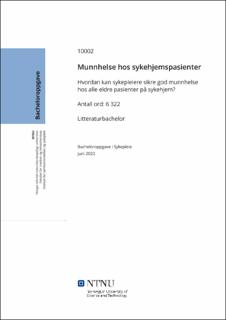| dc.contributor.advisor | | |
| dc.contributor.author | 10002 | |
| dc.date.accessioned | 2022-07-19T17:20:17Z | |
| dc.date.available | 2022-07-19T17:20:17Z | |
| dc.date.issued | 2022 | |
| dc.identifier | no.ntnu:inspera:110921428:52162331 | |
| dc.identifier.uri | https://hdl.handle.net/11250/3006915 | |
| dc.description.abstract | Bakgrunn: Munnpleie til eldre pasienter på sykehjem er nedprioritert. Flere eldre har egne tenner enn tidligere, som gjør behovet for daglig munnpleie større. Når munnpleie nedprioriteres, påvirker dette pasientens munnhelse negativt. Dårlig munnhelse har fysiske, psykiske og sosiale konsekvenser for pasienten. Eldre mennesker med svekket immunforsvar, redusert helse, aldersforandringer i munnhulen og høyt legemiddelforbruk, er spesielt utsatt for munnhelseproblemer og sykdommer i munnhulen.
Hensikt: Undersøke hvilken rolle og funksjon sykepleiere på sykehjem har, når det gjelder ivaretakelse av eldre pasienters munnhelse. I tillegg til å undersøke hvorfor pasientenes daglige munnpleie nedprioriteres, og hvordan ivaretakelse av pasienters munnhelse kan forbedres.
Metode: Oppgaven er et litteraturstudie basert på syv utvalgte forskningsartikler.
Resultat: Munnhelseproblemer på sykehjem er et vanlig syn. Munnpleie sees ofte på som en vanskelig og ubehagelig oppgave, spesielt når pasientene ikke er samarbeidsvillige. Flere utfordringer er forbundet med munnpleie. Utilstrekkelig fokus på, og kunnskap om, temaet, manglende individualisering og lite samarbeid med tannhelsetjenesten, er noen eksempler. Organisatoriske og miljømessige faktorer spiller også inn.
Konklusjon: Eldre pasienter på sykehjem er blant de som er mest utsatt for munnhelseproblemer og sykdommer i munnhulen av ulik alvorlighetsgrad. Vedlikehold av denne pasientgruppens munnhelse, gjennom god, daglig munnpleie, er derfor spesielt viktig. Sykepleiere har ansvar for å sikre at eldre sykehjemspasienters munnhelse blir ivaretatt.
Nøkkelord: munnhelse, munnpleie, sykepleie, sykehjem, eldre | |
| dc.description.abstract | Background: Mouth care is not prioritized enough when it comes to elderly nursing home patients. Several elderlies nowadays have natural teeth, compared to what was common earlier. This places higher requirements for daily mouth care. When mouth care is downgraded, it affects the patient’s oral health. Patients can experience physical, social, and psychological consequences due to poor oral health. A weakened immune system, reduced health status, age-related changes in the oral cavity, and high drug consumption, makes elderly prone to develop mouth health problems and diseases of the oral cavity.
Aim: Examine nurses’ role and function in maintaining elderly patients’ oral health. In addition to understand why patients’ daily oral care isn’t prioritized enough, and how care for patients’ oral health can be improved.
Methods: The assignment is a literature study based on seven selected research articles.
Results: Health problems of the oral cavity in nursing homes, is a common sight. Mouth care is often seen as a difficult and unpleasant task, especially when patients doesn’t cooperate. There are several challenges associated with mouth care. Inadequate focus on, and knowledge of the topic, lack of individualization and missing collaboration with the dental health service, are some of them. Organizational and environmental factors also matter.
Conclusion: Elderly patients in nursing homes are especially prone to oral health problems, and diseases of the oral cavity of varied severity. This makes the maintenance of this group of patients’ oral health especially important. Nurses are responsible for ensuring that elderly nursing home patients' oral health is maintained.
Key words: Oral health, mouth care, nurse, nursing home, elderly | |
| dc.language | nob | |
| dc.publisher | NTNU | |
| dc.title | Munnhelse hos sykehjemspasienter | |
| dc.type | Bachelor thesis | |
